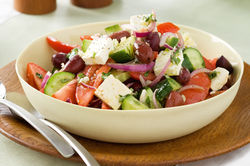 Herbal tea drink |  Collecting herbs |  Herbs processing |  Thyme |
|---|---|---|---|
 Storing herbs |  Spearmint |  Herbal collection |  Oregano |
 Greek salad |  Souvlaki with pita bread |
Based on her extensive experience in collecting herbs and producing home-made cosmetics, Maria will teach her guests how to collect, store and process local herbs, and what their pharmaceutical and therapeutic properties are. They will also have time to enjoy a delicious lunch at a local restaurant, with greek souvlaki, greek salad and beverages
WHAT you will LEARN:
-
The different types of local herbs
-
How to collect local herbs and how to preserve them
-
Herbs’ therapeutic and pharmaceutical uses
Maria – Athens, collecting, preserving and processing local herbs
Itinerary: how we'll spend the day and what we'll do together

The guests will learn all about the local herbs like thyme, savory, mint, spearmint etc, regarding how to collect them, how to preserve them, how to process them in order to produce herbal drinks, and what their pharmaceutical and therapeutic properties are. They will also take a bag of local dried herbs with them

At lunch time, Maria will take her guests at a traditional local eatery where they will enjoy a delicious lunch with greek souvlaki, greek salad, feta cheese and a beverage. This will give them ample opportunity for idea exchanging and informal chit-chat

-
Place of ORIGIN: Athens
-
LIVES in: Pikermi, Attiki
-
SPEAKS: English
-
LOVES: cooking, travelling, reading, greek cuisine, experimenting with hand-made products from natural ingredients
-
Has TRAVELLED to: many European countries, and all over Greece
-
Personal TRAITS: excellent cook, very hospitable, easy going and pleasant person, loves to convey her knowledge to her guests
Booking details
Maria Mpora is your Hostess
Maria studied Marketing and Accounting and spent her entire professional life in the banking sector. She devotes countless hours cooking and experimenting with greek cuisine, which she loves, She is also volunteering at a womens’ charity group, cooking meals for the homeless. In addition, she has also been involved in producing home-made soap and cosmetics, using natural ingredients
-
Place: Pikermi, Attiki
-
Meeting Point: Pallini Metro station, at the ticket office
-
Timetable: 10.30-15.30
-
Price: 79 euros per person (herbs gift bag, lunch and beverages are included)
-
Availability: 20 January–20 July, 3 September–18 December. NOT available on Sundays or on major Christian holidays
-
Group size: 2 persons min, 8 persons max
-
What’s SPECIAL about this experience: the guests will have the opportunity to acquire in-depth knowledge and expertise in collecting, processing and using a diverse range of typical greek herbs
Pikermi, Attiki - Where the Experience will take place
What wikipedia says
Athens is the capital and largest city of Greece. Athens dominates the Attica region and is one of the world's oldest cities, with its recorded history spanning around 3,400 years, and the earliest human presence around the 11th–7th centuries BC. Classical Athens was a powerful city-state that emerged in conjunction with the seagoing development of the port of Piraeus. A centre for the arts, learning and philosophy, home of Plato's Academy and Aristotle's Lyceum, it is widely referred to as the cradle of Western civilization and the birthplace of democracy, largely because of its cultural and political impact on the European continent and in particular the Romans. In modern times, Athens is a large cosmopolitan metropolis and central to economic, financial, industrial, maritime, political and cultural life in Greece. In 2015, Athens was ranked the world's 29th richest city by purchasing power and the 67th most expensive in a UBS study.
Athens is recognised as a global city because of its geo-strategic location and its importance in shipping, finance, commerce, media, entertainment, arts, international trade, culture, education and tourism. It is one of the biggest economic centres in southeastern Europe, with a large financial sector, and its port Piraeus is the largest passenger port in Europe, and the second largest in the world. The municipality (City) of Athens had a population of 664,046 (in 2011, 796,442 in 2004) within its administrative limits, and a land area of 39 km2 (15 sq mi). The urban area of Athens (Greater Athens and Greater Piraeus) extends beyond its administrative municipal city limits, with a population of 3,090,508 (in 2011) over an area of 412 km2 (159 sq mi). According to Eurostat in 2004, the Athens Larger Urban Zone (LUZ) was the 7th most populous LUZ in the European Union (the 5th most populous capital city of the EU), with a population of 4,013,368. Athens is also the southernmost capital on the European mainland.
The heritage of the classical era is still evident in the city, represented by ancient monuments and works of art, the most famous of all being the Parthenon, considered a key landmark of early Western civilization. The city also retains Roman and Byzantine monuments, as well as a smaller number of Ottoman monuments.
Athens is home to two UNESCO World Heritage Sites, the Acropolis of Athens and the medieval Daphni Monastery. Landmarks of the modern era, dating back to the establishment of Athens as the capital of the independent Greek state in 1834, include the Hellenic Parliament (19th century) and the Athens Trilogy, consisting of the National Library of Greece, the Athens University and the Academy of Athens. Athens was the host city of the first modern-day Olympic Games in 1896, and 108 years later it welcomed home the 2004 Summer Olympics. Athens is home to the National Archeological Museum, featuring the world's largest collection of ancient Greek antiquities, as well as the new Acropolis Museum.